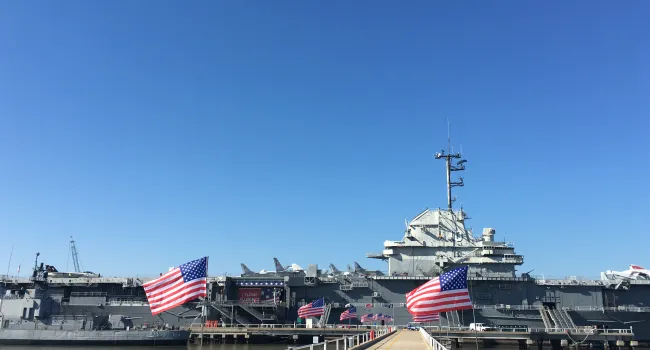USS Yorktown (CV-10) was an Essex-class aircraft carrier that served with the US Navy in World War II and the Vietnam War.
World War II’s famous “Fighting Lady” would participate significantly in the Pacific offensive that began in late 1943 and ended with the defeat of Japan in 1945. The Yorktown received the Presidential Unit Citation and earned 11 battle stars for service in World War II.
In the 1950s, the Yorktown was modernized to operate jet aircraft as an attack carrier (CVA). In 1957, she was re-designated an anti-submarine aircraft carrier (CVS), and would later earn 5 battle stars for service off Vietnam (1965-68). The ship also recovered the Apollo 8 astronauts and capsule (December 1968). The Yorktown was decommissioned in 1970 and placed in reserve.
Today, the ship, is a floating military museum located at Patriot's Point in Charleston, SC. “The Carrier Will Lead” is a documentary film produced by ETV for the USS Yorktown in Charleston. It is used at the Patriot’s Point Naval and Maritime Museum as a part of the USS Yorktown’s visitor experience.
Standards
- 5.3 Demonstrate an understanding of the economic, political, and social effects of World War II, the Holocaust, and their aftermath (i.e., 1930–1950) on the United States and South Carolina.
- 8.5.CO Compare South Carolina and U.S. wartime contributions and demobilization after World War II.
- This indicator was designed to promote inquiry into military and economic policies during World War II, to include the significance of military bases in South Carolina. This indicator was also developed to foster inquiry into postwar economic developments and demographic changes, to include the immigration of Jewish refugees following the Holocaust.
- MWH.4.CX Contextualize World War II and the Holocaust within local and global economic, political, and social developments from 1919– 1950.
- MWH.4.CC Analyze significant political and economic developments as catalysts for changing the global power structures.
- USHC.4.CO Develop a comparative analysis of the motives for and outcomes of American policies regarding foreign intervention.



